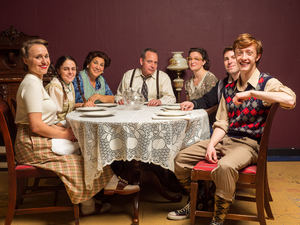Review: A Sure-Footed BRIGHTON BEACH MEMOIRS at Vagabond Players

It's easy to see why it took Neil Simon at least nine years to write the semiautobiographical Brighton Beach Memoirs, now being revived by the Vagabond Players. Simon confronted two issues: Brighton Beach could not make up its mind what kind of play it wanted to be, and Simon, whose parents were still living when he wrote it, had to pull his punches when writing about them in it. The indecision about genre was related to his problem being direct about his parents. A true account would necessarily have revealed their fighting, his father's desertions and infidelities, and the eventual failure of their marriage, and could only have been presented as a tragedy or melodrama. A comedy (and Brighton Beach is formally a comedy) would need to present a sanitized version of what Simon remembered; it would satisfy his audience (which expected comedies) and his parents, but it would also come further from the flavor Simon wanted to present.
What we get in consequence is a play in three somewhat inconsistent genres. Act One gives us a family comedy, in which a family battles through issues arising from being working class and Jewish in New York in the Depression (bad cashflow, ethnic discrimination, and intimations of the gathering Holocaust) and the normal stresses and strains of family life, especially for the four adolescents and young adults in the household. To see Act One in isolation, one would assume that this is a fundamentally sunny play about a family doing what it needs to do and nurturing its youngsters successfully - the same kind of idealized family portrait Eugene O'Neill painted of his actually pretty catastrophic family in Ah, Wilderness! But Act Two could almost have come from another play. Suddenly we seem to be witnessing the total and tragic disintegration of the family, in effect Simon welching on the implicit promise imparted by the tone of Act One that everything will be fine. Then, probably because Simon knew he couldn't finish the play along those lines (his contract with his audiences having almost always previously included the promise of a happy ending along with plenty of laughs along the way), the family ship mostly rights itself in ways that are not totally comprehensible or convincing.
The audience may well consider itself rescued from this unevenness by the one reliably comic and true-seeming thread that runs through the whole show: the portrait of Simon's avatar, Eugene Jerome (Drew Sharpe), a 15-year-old witnessing these things at a remove, at least a psychological remove. The discovery of sex is so absorbing to him that he cannot be entirely bothered by whatever is befalling the rest of his clan. Probably the biggest laughs of the evening are occasioned by his efforts to ogle a female cousin, lay his hands on some pornography (a challenging feat in a pre-Internet, even pre-Playboy era), and come to terms in a less-than-forthright world with norms for sexual behavior like masturbation. His sheer triumph when he hits one or another milestone in this discovery process ends both acts. That said, this being a memory play, Eugene's adult perspective is clearer and more comprehensive than his adolescent one, and he remains the point-of-view character for all of the action, even events in which he does not participate. Mr. Sharpe makes easy work of the strange feat of enacting a sex-and-baseball-dazzled youngster but simultaneously, without dropping character, presenting a mature retrospect.
The rest of the cast turns in equally solid work. As Kate and Jack, the mother and father, Amy Jo Shapiro and Tom Piccin do yeoman work in traversing this tonal minefield of a play, making Jack and Kate's trials and tribulations, with the economy but also with each other and their children, very real, but in the end not quite overwhelming. Andy Belt does a touching turn as Stanley, the older brother based on Simon's real-life brother who became his writing partner; Stanley's redemption, despite financial and other kinds of irresponsibility, comes from his contrition when he screws up, and especially from his unwavering mentorship of young Eugene. And Allison McAllister, Kyla Tacopina, and Marianna Fleischman were spot on as Eugene's aunt and cousins, each with very distinct stories. And though it's not a huge thing, I was also impressed with the way these actors, all with mid-Atlantic roots, maintained appropriate accents throughout the entire experience. Hats off as well to director Steve Goldklang, whose consistent work in Baltimore community theater, especially at Vagabonds and Fells Point Corner Theatre, I never fail to admire.
Neil Simon, who died less than two years ago, is no longer everyone's cup of tea, as he once was. Old-fashioned dramas about white heterosexual families and laugh-a-minute comedies, Simon's stock-in-trade, are not what the theater world mainly seeks out and honors these days. And some of his sexual comedy seems a bit unenlightened in a more woke era. (Brighton Beach Memoirs opened on Broadway in 1983.) But the three Tony awards and fourteen additional nominations he received over his career are evidence of the high esteem in which he was held by his contemporaries, and such consistent regard is not usually misplaced. As difficult as this play is, its very challenges are a testament to Simon's talent. A lesser playwright might not have tried to blend such disparate components or to make them work together even as well as they do.
A sure-footed presentation of a challenging if ultimately enjoyable work.
Brighton Beach Memoirs, by Neil Simon, directed by Steve Goldklang, presented through February 9 by Vagabond Players at Vagabond Theatre, 806 S. Broadway, Baltimore, MD 21231. Tickets $19-$22, at (410) 563-9135 or vagabondplayers.org. Explicit discussion of sexual matters.
Photo Credit: Bruce F. Press Photography.
Reader Reviews

Videos

